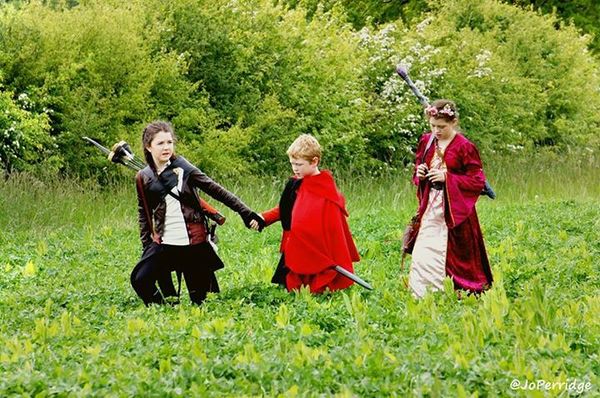Dawn children
m (→Pages: insert anchor) |
No edit summary |
||
| (33 intermediate revisions by 8 users not shown) | |||
| Line 1: | Line 1: | ||
Despite - or perhaps because of - the warlike nature of life in Dawn, the children of [[ | {{CaptionedImage|file=FirstQuest.jpg|title=Bella Loreal and Owain Loreal seeking adventure, with the guidance of their "cousin" Pickle Foxden, Navarri scout|align=right|width=600|caption=Dawnish children are allowed a great deal of freedom to play -and to get into mischief.}} | ||
Despite - or perhaps because of - the warlike nature of life in Dawn, the children of [[Yeofolk of Dawn|yeofolk]] and [[Noble house|nobles]] alike are sheltered, indulged and encouraged to make the very most of their childhood. They are not expected to undertake apprenticeships or work for their parents until they are of age, but instead are allowed a great deal of freedom to play. It is a parent's responsibility to educate their children to a reasonable standard, and most can read, write, perform arithmetic and understand imperial and national history by adulthood. | |||
Play, however, is not unstructured, and children are encouraged to participate in games which develop skills they | Play, however, is not unstructured, and children are encouraged to participate in games which develop skills they may need later in life. Particularly popular amongst the noble houses are games of war, where children learn how to correctly handle weapons, fight individually and in groups and learn to command troops in miniature. Minstrels often teach such things, using the tales of great heroes to inspire and structure the games. | ||
Children born into or adopted into noble houses are often given positions of responsibility as [[Squire|squires]]. | |||
Children born into or adopted into noble houses are often given positions of | |||
=== Things every child should know === | === Things every child should know === | ||
* '''A challenge lost makes you a better opponent next time''' - | * '''A challenge lost makes you a better opponent next time''' - Do not be afraid of failing, as long as you learn from it. | ||
* '''Follow your heart but use your head.''' - | * '''Follow your heart but use your head.''' - Be true to yourself but make sure you think things through and ask the advice of those who can help. | ||
* '''Learn from heroes, do not copy them''' - Heroes past and present have much to respect, but make sure you know how and why they accomplished their great deeds, not just that they did. | * '''Learn from heroes, do not copy them''' - Heroes past and present have much to respect, but make sure you know how and why they accomplished their great deeds, not just that they did. | ||
* '''There is no honour in letting someone win''' - Giving away your victory dishonours both you and your opponent. Once the glory fades, they will not thank you. | * '''There is no honour in letting someone win''' - Giving away your victory dishonours both you and your opponent. Once the [[glory]] fades, they will not thank you. | ||
* '''Be proud of your achievements, however small''' - A small deed done today may lead to a greater one tomorrow | * '''Be proud of your achievements, however small''' - A small deed done today may lead to a greater one tomorrow. | ||
* '''Know what your name means''' - Who are you named after? Be ready to tell anyone who asks a story about your namesake. | |||
[[Category: | [[Category:Children]] | ||
{{Dawn Links}} | |||
Latest revision as of 15:45, 19 February 2020
Despite - or perhaps because of - the warlike nature of life in Dawn, the children of yeofolk and nobles alike are sheltered, indulged and encouraged to make the very most of their childhood. They are not expected to undertake apprenticeships or work for their parents until they are of age, but instead are allowed a great deal of freedom to play. It is a parent's responsibility to educate their children to a reasonable standard, and most can read, write, perform arithmetic and understand imperial and national history by adulthood.
Play, however, is not unstructured, and children are encouraged to participate in games which develop skills they may need later in life. Particularly popular amongst the noble houses are games of war, where children learn how to correctly handle weapons, fight individually and in groups and learn to command troops in miniature. Minstrels often teach such things, using the tales of great heroes to inspire and structure the games.
Children born into or adopted into noble houses are often given positions of responsibility as squires.
Things every child should know
- A challenge lost makes you a better opponent next time - Do not be afraid of failing, as long as you learn from it.
- Follow your heart but use your head. - Be true to yourself but make sure you think things through and ask the advice of those who can help.
- Learn from heroes, do not copy them - Heroes past and present have much to respect, but make sure you know how and why they accomplished their great deeds, not just that they did.
- There is no honour in letting someone win - Giving away your victory dishonours both you and your opponent. Once the glory fades, they will not thank you.
- Be proud of your achievements, however small - A small deed done today may lead to a greater one tomorrow.
- Know what your name means - Who are you named after? Be ready to tell anyone who asks a story about your namesake.
Further Reading
Core Brief
Additional Information
